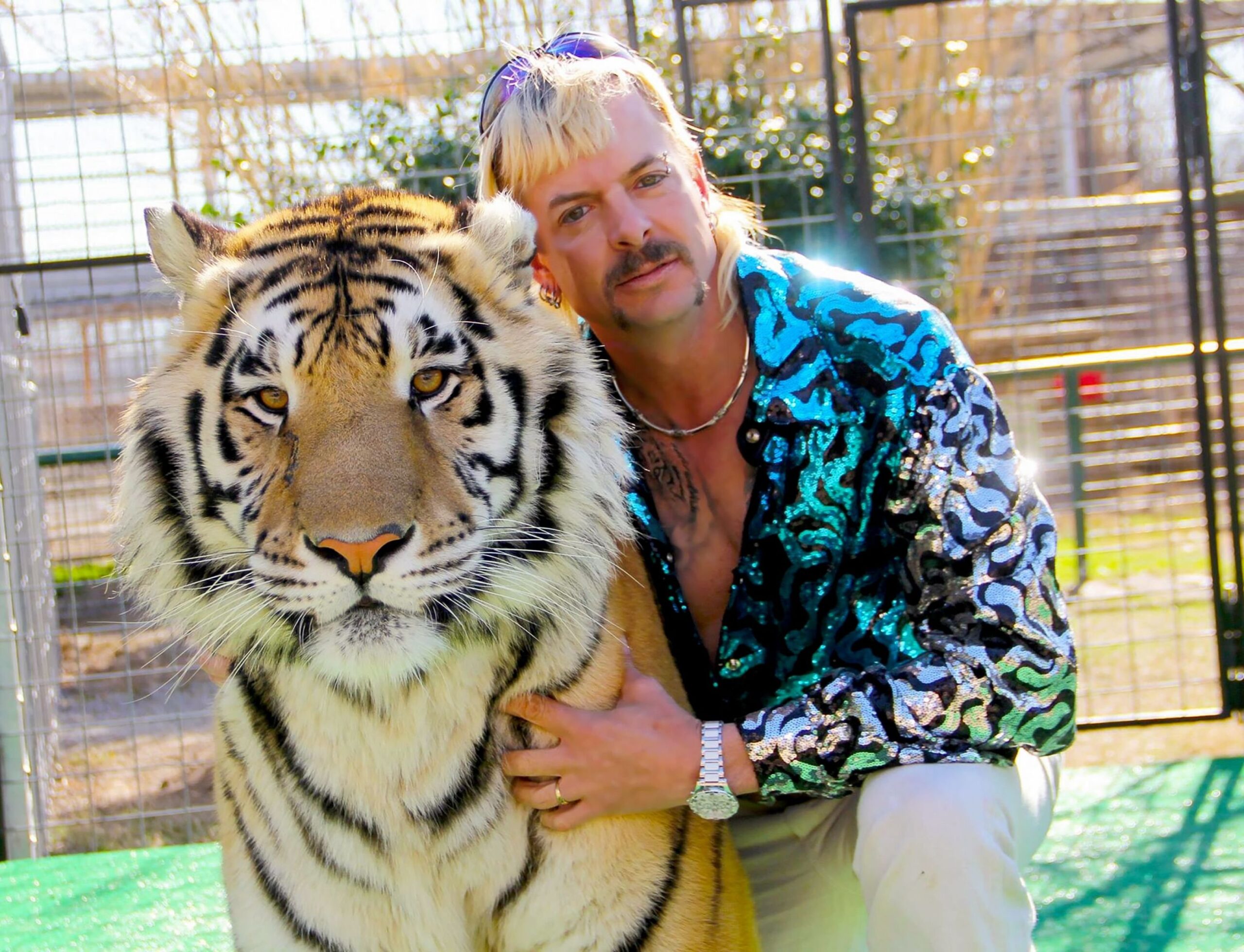CULTURE
Joe Exotic, “Tiger King,” and the Terrifying Truth About Cat People
25 Mar, 20

Netflix/Kobal/Shutterstock
In the lead-up to the 2016 presidential election, John Oliver introduced the world to an eccentric write-in candidate who went by the professional alias Joe Exotic.
Joe ran a “private zoo for tigers” in Oklahoma and went through a rundown of his qualifications in clips that Oliver aired on his HBO show, Last Week Tonight: “I refuse to wear a suit … I am gay. I’ve had two boyfriends most of my life … I’m broke as sh*t, I have a judgment against me from some b*tch down there in Florida.” With a pistol on his hip and fringe on his sleeves, Joe strutted around a tiger enclosure in a knee brace, wielding the cane he would later use to fend off a tiger attack. At the time Joe seemed like a quintessentially American character—deeply strange, but largely harmless. He was a folk hero of sorts—the kind of person who has made it his life’s work to fully embrace who he is and expects the rest of the world to do the same.
Third Parties: Last Week Tonight with John Oliver (HBO)www.youtube.com
The fact that he was the subject of a would-be reality show—Joe Exotic: Tiger King—made perfect sense. The fact that he was later arrested and convicted on a murder-for-hire charge betrayed the fact that he was not as harmless as he seemed. The new Netflix documentary, Tiger King: Murder, Mayhem and Madness, dives deep into the dark side of Joe Exotic and of big cat collectors in general—introducing viewers to a world that is far stranger than even Joe’s campaign videos suggest. Through a series of alarming twists and revelations, it leaves the viewers with a lot of questions and uncertainties but one irresistible conclusion: Exotic animal collectors—and big cat specialists in particular—are frightening people. Spoilers ahead.
There are five prominent collectors who participated in interviews for the documentary, detailing their histories with exotic animals and with the people they exploit to run their “zoos.” One of these collectors, Mario Tabraue, is thought to be an inspiration for Al Pacino’s Tony Montana in Scarface and was involved in the murder and dismemberment of a federal agent. His drug smuggling operation in the 1970s and ’80s used exotic animal smuggling (also illegal, but less harshly punished) as a cover, and it even involved cutting snakes open to stuff them with bags of coc*ine. After serving 12 years of a 100-year sentence—and allegedly cooperating with authorities in other investigations—Tabraue was released and opened the Zoological Wildlife Foundation, which is now one of Florida’s premiere private zoos. Tabraue’s story is perhaps the least upsetting of the five.
The other four collectors are as follows: Jeff Lowe, the circus heir and “legitimate businessman,” a walking midlife crisis who would smuggle baby tigers into Las Vegas hotels inside of suitcases as bait to lure young women to his hotel room; “Doctor” Bhagavan Antle, the spiritual guru, Hollywood animal wrangler, and possible cult leader with three wives/girlfriends, who houses his overworked staff of young, attractive female interns in roach-infested horse stalls and convinces them to change their names and get plastic surgery; Carole Baskin, the woman who started out as a big cat breeder who provided animal encounters but pivoted to advocating against those practices and operating the Big Cat Rescue sanctuary—with a massive team of overworked volunteers—after the sudden disappearance of her wealthy, philandering husband; and finally, of course, Joe Exotic himself.
Joe is the working-class version of the same big cat insanity the others represent, complete with a (lip-synced) country music career. In interviews, Joe speaks of his admiration for the domineering mystic figure of “Doc” Antle, who has been accused of killing his cats when they are no longer profitable and may or may not believe that his genitals can confer enlightenment—particularly upon virgins. Joe, on the other hand, had no interest in women or in mysticism. He loved men and tigers and guns and partying, and he devoted himself with passion to all four. When he felt that life and his park was at risk of being taken away, Joe once assured a TV reporter that it would result in “a mini Waco,” referring to the deadly standoff between federal agents and the Branch Davidian religious sect in 1993.
Joe’s business relied largely on drug addicts, felons, and misfits whom Joe provided with a pittance, some expired meat, and what can loosely be referred to as housing in exchange for their work. If someone in the area of Wynnewood, Oklahoma was at the end of their rope, Joe would be there to offer them a fresh start…and some drugs. While many of his employees were undoubtedly saved from worse fates by Joe’s intervention, Joe was never really interested in a “clean” lifestyle for himself or his staff. And when one of those desperate people whom he saved happened to be an attractive young man, Joe could provide for that young man’s habits in exchange for sharing Joe’s bed—regardless of their sexuality.
In Tiger King Joe openly acknowledges that he “fell in love with straight guys” and cites Wynnewood’s demographics as his excuse. When one of Joe’s two “husbands” (plural marriage is not legal in the US) John Finlay left him for the woman who worked at the animal park’s front desk, he did so with noticeably fewer teeth than when their relationship started. Their “marriage” seems to have been largely based on smoking m*th together. Joe’s other husband wasn’t lucky enough to get out. Travis Maldonado was with Joe from the ages of 19 to 23 and, by all accounts, did little in that time other than get high, shoot guns, and sleep with the women at the park. He was in the offices of Joe’s zoo when he accidentally shot himself in the head in 2017, playing with a gun that he believed to be unloaded. Joe was 54 at the time.
But the true insanity of Joe’s story comes from his years-long feud with Carole Baskin—the woman he described in his campaign video as “some b*tch down there in Florida.” In response to her many efforts to outlaw and stigmatize the practices at his and similar big cat parks—in particular the breeding and selling of big cats for up-close entertainment—Joe engaged in a campaign of harassment that generally focused on accusations of murder, hypocrisy, envy, and the sadistic slaughter of rabbits.
In daily internet broadcasts, Joe regularly insulted Carole Baskin and “the animal rights people,” read from her diary, and depicted various kinds of violence against mannequins and sex dolls standing in for her. He made an entire song and accompanying music video claiming that she murdered her husband Don Lewis in 1997 (an accusation that Lewis’ family finds eminently credible). But the step that wound up costing him everything was when he stole her Big Cat Rescue trademark for his own business.
The lawsuit that ensued would eventually result in a million dollar finding in favor of Baskin—a sum that Joe would never be able to pay. No doubt his eventual murder-for-hire plot was both an effort to get out from that financial burden and to enact some vengeance against Baskin—who made the continued operation of his park impossible and life much worse for the big cats that were living there. Along the way he had drained his elderly mother of her savings in order to keep on top of his legal fees.
Joe Exotic Country Music “Here Kitty Kitty”www.youtube.com
It was around that time that Joe became concerned that his contract with Rick Kirkham—the man attempting to make a reality show out of Joe’s life—offered little opportunity for Joe to profit, while opening him up to numerous legal liabilities regarding the dubious practices in his park. In March of 2015, the studio where Joe shot his Internet show was burned down in an act of arson that destroyed all of Kirkham’s reality show footage along with a reptile house where seven alligator’s and a crocodile were “boiled alive in a towering inferno.”
Joe and the people in his life have attempted to direct suspicions toward Kirkham and toward Carole Baskin—whom they accuse of hiring Kirkham for the job. As for Joe, his defense is that he was out of town at the time and that he loves his animals too much to be involved. But those points are made suspect by his now-proven willingness to commit violent crimes by proxy and by the way he workshopped and dramatized that “towering inferno” line for a fundraising video.
Tiger King makes it clear that Joe Exotic is never above using the drama of a situation to his advantage as a performer. In episode five viewers are treated to Joe’s eulogy at Travis Maldonado’s funeral, which Joe turned into a stand-up performance before breaking out in (lip-synced) song.
In 2018 Joe was convicted of two counts of murder-for-hire and of several crimes involving the treatment and sale of his cats. His beloved park now belongs to Jeff Lowe—who is in the process of re-branding and relocating. In January, Joe was finally sentenced to 22 years in prison. The story of how he got there features so many surprises and dark revelations that it would be impossible to do Tiger King justice here, but the resounding message is delivered in the first moments of episode one: “Animal people are nuts” one voice offers; and another chimes in, “The monkey people are a little bit different … they’re kind of strange. But the big cat people are backstabbing pieces of sh*t.”
Whatever else you can glean from the five hours of insanity that is Tiger King, it’s clear that—if you don’t want to be mauled, sued, slandered, murdered, exploited, or brain-washed—you should never get involved with big cats or the kind of people who collect them. In other words: don’t f*ck with cat people.
- Tiger King Zoo Reopens for Dangerous Stupidity Once More – Popdust ›
- Is Carole Baskin Really “Just as Bad as Joe Exotic”? – Popdust ›
- All Of Tiger King’s Joe Exotic’s Music Videos, Including “Here Kitty Kitty” And “I Saw a Tiger” – Popdust ›
- Will Carole Baskin of “Tiger King” Finally Become a Suspect in her Husband’s Disappearance – Popdust ›
- Tiger King review: Netflix’s documentary series is ethically … ›
- Tiger King Directors Share How They Made The Netflix Show … ›
- Netflix’s Tiger King: Where Are Joe Exotic and Carole Baskin Now … ›
- ‘Tiger King’ review: Netflix’s docu-series about Joe Exotic is the … ›
- The True Story of Tiger King and Joe Exotic | POPSUGAR … ›
- ‘Tiger King’ sentenced to 22 years for violence against tigers and … ›
- Tiger King: Murder, Mayhem and Madness | Netflix Official Site ›












